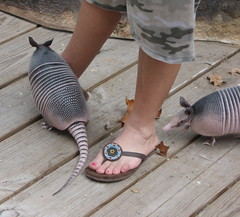 Global warming has species on the move – for instance, making Vermont less hospitable to its iconic maple trees. Meanwhile, warm-weather species are taking the opportunity to move north, and according to a recent study, armadillos could move north into Virgina & across the entire Mid-Atlantic region:
Global warming has species on the move – for instance, making Vermont less hospitable to its iconic maple trees. Meanwhile, warm-weather species are taking the opportunity to move north, and according to a recent study, armadillos could move north into Virgina & across the entire Mid-Atlantic region:
The consequences of such changes are unclear. Armadillos are a welcome help to residents dealing with fire ants, a big concern in the South, McDonough said. But they’re also a nest predator and could put added pressure on local quail populations already trying to defend against possums, raccoons and snakes.
[University of Michigan biology professor Philip] Myers’ research in Michigan, meanwhile, suggests southern species are replacing northern ones, rather than simply slotting into the local fauna.
“To predict the impact of adding a chipmunk or subtracting a mouse, you have to know a lot more about the natural history of the communities than we do … Potentially there are huge changes that could be a consequence of messing around with the species present,” Myers said.
See a map of the armadillo’s projected range at DailyClimate.org. The quail connection is an example of the cascading effects of the climate crisis. Even if a quail can survive in a region that’s rapidly becoming warmer & wetter, it may not survive a new predator moving into its habitat. It’s also a major reason so many sportsmen have become climate activists.




![Sunday News: “Trump Is Briefed on Options for Striking Iran as Protests Continue”; “Trump and Vance Are Fanning the Flames. Again”; “Shooting death of [Renee Good] matters to all of us”; “Fascism or freedom? The choice is yours”](https://bluevirginia.us/wp-content/uploads/2026/01/montage011126.jpg)
![VA DEQ: “pollution from data centers currently makes up a very small but growing percentage of the [NoVA] region’s most harmful air emissions, including CO, NOx and PM2.5”](https://bluevirginia.us/wp-content/uploads/2026/01/noxdatacenters.jpg)












